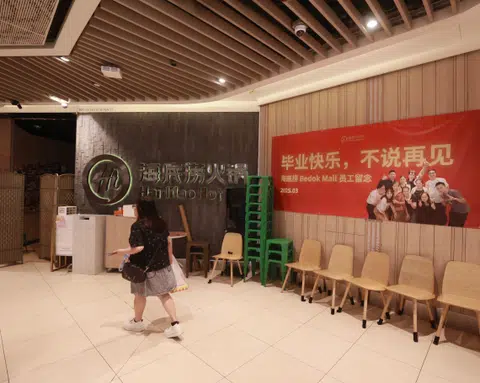Haidilao to close Clarke Quay outlet on Aug 31 after three earlier outlet closures
The Chinese hotpot chain recently shuttered three outlets in Bedok, Pasir Ris, and Punggol.
Popular Chinese hotpot chain Haidilao is closing its flagship Singapore outlet in Clarke Quay on Aug 31 as its lease expires.
A text message was sent out to Haidilao members on Aug 13 to inform them of the closure.
The flagship outlet at CQ @ Clarke Quay, a space managed by CapitaLand, opened in 2012 and marked the brand's entry into Singapore.
In a statement on Aug 13, a Haidilao Singapore spokesperson said: "This was our very first outlet in Singapore and served as an introduction to Chinese hotpot for many local diners. It also holds countless fond memories for our team and guests alike."
"Looking ahead, we will continue to serve the local market through diverse concepts and elevated dining experiences," the spokesperson added.
The impending closure of the Clarke Quay outlet follows Haidilao's recent shuttering of three suburban restaurants - in Bedok, Pasir Ris and Punggol - after a period of rapid expansion.
A Haidilao spokesperson previously told The Business Times that the brand's key business considerations include labour costs, outlet locations and rental costs.
It had noted that some of its stores are shifting focus as they optimise resources and expand menu offerings.
A spokesperson for CQ @ Clarke Quay thanked Haidilao for "their close partnership over the past 13 years".
"Given its (Haidilao's) strong presence across the island, we have mutually agreed that it is time for Haidilao Hotpot's #1 Store unit to be refreshed with a new tenant at the end of its lease.
"We remain close partners in China, Malaysia and Singapore," said the spokesperson in a statement on Aug 13.
Savills Singapore highlighted the softer demand for retail space in the central region in an Aug 13 report.
Weak market sentiment continues to weigh on leasing demand for retail space, with islandwide retail vacancy rising to 7.1 per cent on quarter in the second quarter of 2025.
Retail trade in the central region has been less resilient to rising rents and business operational costs, leading to a weakening demand for retail space, it noted.
The vacancy rate in the region rose to 8.2 per cent in the second quarter of 2025, compared with 7.6 per cent in the previous quarter.
Notably, the downtown core area, where Clarke Quay is located, saw slower take-up in the recorded quarter, with occupied space shrinking by 75,000 sq ft.
The vacancy rate in the Orchard and fringe area remained relatively flat due to limited supply, said the Savills report.
Central region rents rose by 0.9 per cent in the second quarter of 2025, reversing from a 0.5 per cent decline in the previous quarter, data from the Urban Redevelopment Authority showed.
The rental index in the central area and fringe area also saw a rebound in the recorded quarter, rising by 0.7 per cent and 0.9 per cent on quarter, respectively.
According to Savills' basket of retail properties, the average monthly rent in the Orchard and suburban areas inched up 0.5 per cent on quarter to $23.30 per sq ft (psf) and 0.4 per cent on quarter to $14.80 psf, respectively.

Savills expects the Singapore economy to see subdued growth in the second half of the year, amid uncertainties caused by tariffs and a tapering of non-oil domestic exports after businesses front-loaded their exports to beat potentially higher tariffs.
"This could spill over into domestic-oriented sectors such as retail and food and beverage (F&B), which have reported muted performance in the first half of the year," it added.
"Although the distribution of government consumption vouchers could help to lift the retail sales activity, overall retail sales in the next few months are forecast to head sideways due to similar performances in economic numbers and cautious hiring sentiments," said Savills.
It also noted that the recent signs of softening in resident employment could dampen spending power in Singapore, while the strong Singapore dollar continues to divert spending abroad for value products.
The consultancy expects higher tenant turnover rate as underperforming stores vacate.
"While prime units will usually soon get filled up by new tenants, landlords may have to offer shorter leases or more attractive rental incentives to keep the less prime units occupied."
Chong Xin Wei for The Business Times